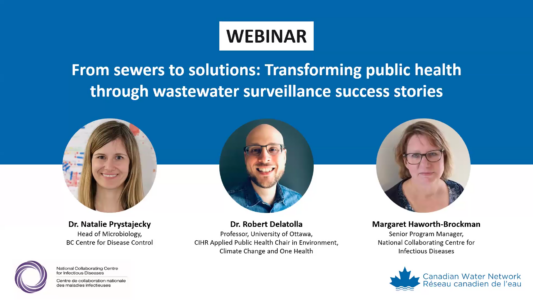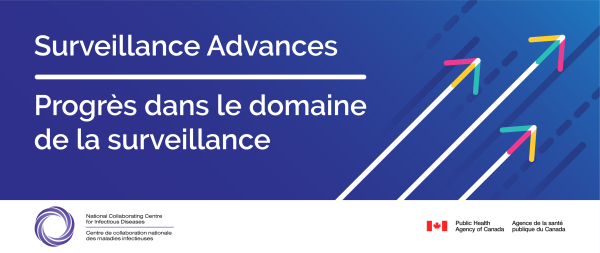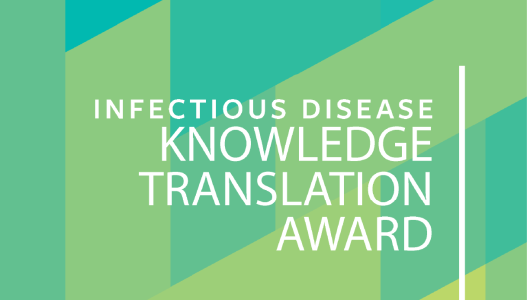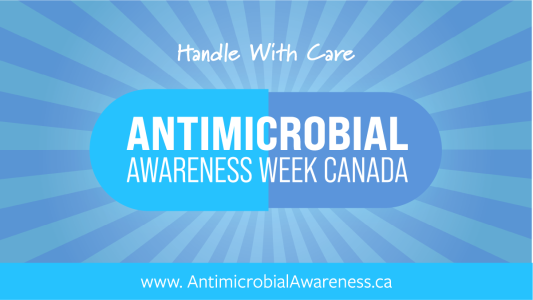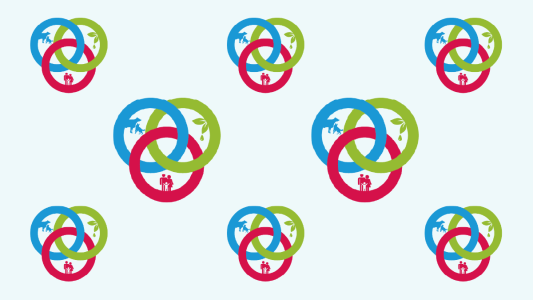
An emerging infectious disease is an infectious disease that appears in a population for the first time, or that may have existed previously but is spreading to new areas or has rapidly increasing case numbers. Outbreaks are the number of disease cases beyond what would normally be expected for a community, geographical area or season.
This NCCID project stream aims to provide public health practitioners, policy makers and public health inspectors, with the most recent information available on emerging infectious diseases and outbreaks. Through webinars, podcasts, publications and other online resources, we endeavor to enhance and strengthen effective knowledge sharing between health practitioners and the public.
What’s New
Canadian Wastewater Survey (CWS): Modelling Report
This document shows the current level of SARS-CoV-2 in the wastewater in cities across the country. In the plots below, the horizontal axis displays the month, and the vertical displays the wastewater signal as SARSCoV-2 genome copies per ml (gcp/ml). The green and orange threshold lines display the historical 25th and 75th percentile, respectively. Information on how these values are calculated can be seen in Appendix 2: Technical Documentation. The current level compared to historical data and trends for each city are shown in the top left corner of each plot, and the key messages highlight recent important changes in the data.
National Wastewater Monitoring Program
Wastewater has already been used to show early detection of COVID-19 in some Canadian jurisdictions prior to an increase of clinically diagnosed cases. As COVID-19 can be characterized by symptomatic and asymptomatic infection, it is important to identify the presence of undiagnosed cases to minimize the likelihood of outbreaks.
From Sewers to Solutions: Transforming Public Health Through Wastewater Surveillance Success Stories
Over the past few years, wastewater-based surveillance (WBS) has rapidly emerged as a valuable tool in public health, providing community-level insights on infectious diseases, substances of potential abuse and other agents of interest.
Measuring What Counts: Equity Prompts for Public Health Preparedness and Resilience
This guidance document encourages decision-making and action for pandemic preparedness and response that explicitly incorporate attention to structural and social determinants of health and address health inequities; and
Augments existing public health system resilience indicators to measure performance in addressing inequities and sustaining or enhancing equitable approaches now and in future outbreaks and pandemics.
From Data to Action: Cancer Surveillance and Occupational Diseases
This seminar includes a presentation by Dr. Donna Turner on cancer surveillance. Then, Dr. Jeavana Sritharan and Dr. Paul Demers present on Ontario’s Occupational Disease Surveillance System (ODSS).
Resources
Canadian Databases for Disease Vectors
Mathematical modelling is a method of research that allows for simulations of the real world in a virtual space. For Public Health, the results of modelling can be used to determine possible interventions and optimize desired outcomes for populations.
At the 2016 5th biennial workshop of the Pan-InfORM research group, public health practitioners and analysts and mathematical modelling researchers were brought together to learn from each other how the two disciplines – modelling and public health – can collaborate to improve disease prevention and control. In the course of discussions about new frontiers for modelling and infectious diseases public health, modelers and epidemiologists expressed interest in knowing where to find data on vectors (e.g., mosquitos and ticks) that can be used to predict emerging diseases.
To address this gap, NCCID and NCCEH have compiled a list of provincial entomology datasets on vectors, including what information the databases contain and who to contact to access the data.
Public Health Quick Links: Group A Streptococcus
Outbreaks of Group A Streptococcus have intensified in the past few weeks in Canada. NCCID has developed this Quick Links resource for Canadian public health professionals to provide links to key resources and information. The pages below will be updated regularly, as needed, to remain relevant as new information emerges. Please feel free to forward this resource to others and post as needed.
Public Health Agency of Canada (PHAC):
Center for Disease Control and Prevention (CDC):
- Group A Streptococcus Overview
- Diseases caused by Group A Streptococcus
- Information for Clinicians
- Treatment Guidelines
- Necrotizing Fasciitis
- Streptococcal Toxic-Shock Syndrome
News and Literature:
Ontario Specific News and Literature:
To share your questions or comments about our Group A Strep work, or to discuss the possibility of partnering with us, please contact us at nccid@umanitoba.ca
Climate Change and Vector-borne Disease (VBD)
Vector-borne diseases (VBDs), caused by agents such as West Nile, Chikungunya virus, etc., pose a risk to the health of Canadians. Climate change has been predicted to have a significant impact on the distribution of vector-borne diseases and thus introduce new challenges to public health in Canada. Additionally, factors such as international travel and northward spread from other endemic southern areas of the continent contribute to the establishment of new outbreaks. These diseases can successfully be prevented through informed protective measures. NCCID seeks to respond to the growing need of public health practitioners with new information on climate change trends and emergence of VBDs that threaten the health of Canadians.
RELATED
- Emerging challenges of vector-borne diseases and cities (Canada Communicable Disease Report, October 2016)
Public Health Quick Links: Zika Virus
Global attention to Zika virus continues with new information and developments nearly every week. NCCID has assembled these links to key leaders and sources in infectious diseases prevention, control and knowledge for public health in Canada.
- Public Health Agency of Canada (PHAC): Zika virus
- Center for Disease Control and Prevention (CDC): Zika & Pregnancy
- European Centre for Disease Control (ECDC): Factsheet for health professionals
- World Health Organization / Pan-American Health Organization (WHO / PAHO): Zika Communications Materials
Podcast
Our first run of the Infectious Questions podcast focuses on an emerging infection very prominent in the media: Zika virus.
• IQ1: Zika Virus and pregnant travellers
• IQ2: Sexual transmission of Zika Virus
• IQ3: Birth defects and the Zika Virus
• IQ4: Should pregnant travellers to Zika-endemic areas undergo amniocentesis?
• IQ5: Should mothers infected with Zika during pregnancy breastfeed?
Disease Debriefs
Disease Debriefs answer questions about important and emerging infectious diseases for public health decision makers, physicians, inspectors and nurses in community.
- Disease Debrief: Ebola
- Disease Debrief: Group A Streptoccus
- Disease Debrief: Mumps
- Disease Debrief: Measles
- Disease Debrief: Pertussis
ARCHIVE:
- Disease Debrief: MERS-CoV
- Disease Debrief: EV-D68
- Influenza Season 2013/14
- Influenza H7N9
Events
NCCID and CFID Infectious Disease Knowledge Translation Award
NCCID and CFID offer the Infectious Diseases Knowledge Translation Award to encourage student involvement in knowledge translation and health promotion on preventing and controlling infectious diseases. Applications accepted until January 13, 2023
Sustaining a Voice for a Silent Public Health Crisis: World Antimicrobial Awareness Week 2022
Antimicrobial Awareness Week (formerly Antibiotic Awareness Week), November 18 – 24, promotes informed, careful use of these life-saving medicines to help keep them working for future generations.
Iconic buildings and landmarks Go Blue for antimicrobial resistance throughout Canada
Canadian buildings and landmarks are sparking up in light blue on Thursday, November 24th, to mark the close of World Antimicrobial Awareness Week. The World Health Organization (WHO) has declared antimicrobial resistance (AMR) as one of the top 10 global health threats.
2021 One Health Antimicrobial Stewardship Conference Final Report
The report summarizes the key concepts of each presentation and discussion panel, from the One Health Antimicrobial Stewardship Conference, hosted by the ABVMA March 10-12, 2021.
A look at the global vaccine rollout for COVID-19
The Coronavirus disease (COVID-19) is a global pandemic as announced by World Health Organization (WHO, March 11th 2020). It is…
Glossary of Terms: Understanding the Regulatory Review of Drug Therapies
NCCID has assembled a glossary of terms related to regulatory processes for ensuring the safety and efficacy of drug therapies, including new drugs and new therapeutic applications for existing drugs. The aim is to increase understanding of these terms and transparency on related policies that protect Canadians.


